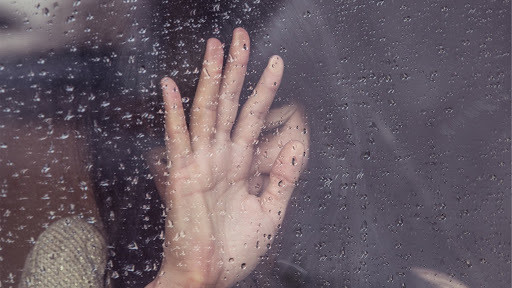Crying once a week is the secret to a stress-free life

Japan is actively encouraging its schoolchildren and workforce to reap the mental health benefits that shedding tears bring. Image: REUTERS/Toru Hanai

Get involved with our crowdsourced digital platform to deliver impact at scale
Stay up to date:
Mental Health
If you’ve ever watched a good tear-jerker of a film and felt strangely happier afterwards, you’ll know the power of a good cry.
Now it seems Japan is actively encouraging its schoolchildren and workforce to reap the mental health benefits that come with shedding a few tears.

Former high school teacher and self-styled ‘namida sensei’ (tears teacher) Hidefumi Yoshida has been giving lectures about the importance of crying to companies and schools for almost six years.
He told the Japan Times: “The act of crying is more effective than laughing or sleeping in reducing stress. If you cry once a week, you can live a stress-free life.”
In 2014, Yoshida teamed up with Hideho Arita, professor emeritus at the Faculty of Medicine at Toho University, and others, to raise awareness of how crying can reduce stress. When Japan brought in mandatory workplace stress checks in 2015 for companies with more than 50 employees, they were inundated with invites to speak with employees about the power of crying.
Global mental health

Japan, like many other countries, has only recently started to deal openly with the mental health issues some individuals experience. Until the late 1990s, depression wasn’t a term used widely outside the psychiatric profession.
But the stigma persists. In a 2016 London School of Economics study of eight countries, employees in Japan were the least likely to tell employers about depression, followed by Americans. Overwork is a such a big problem that the Japanese invented a word -- karoshi -- for deaths caused by overworking.
Although Japan is known to have one of the highest suicide rates in the developed world, numbers have dropped by more than one-third (38%) since its peak in 2003, to 21,321 cases in 2017. At 16.6 for every 100,000, it’s still too high though - among the G20 countries, Japan has the third-highest rate of suicide, behind South Korea (25.8) and Russia (19.3).
More than 90% of those who attempt suicide suffer from depression. According to figures from the World Health Organisation (WHO) released on World Mental Health Day in October, half of all mental illness begins by the age of 14, but most cases are not spotted or treated. Suicide is the second most common cause of death among young people aged 15 to 29.
In its Mental Health Action Plan 2013-2020, the WHO reported that depression is among the largest single causes of disability worldwide and accounts for 4.3% of the global burden of disease.
The economic impact is huge. The LSE study estimates depression collectively costs Brazil, Canada, China, Japan, Korea, Mexico, South Africa and the USA more than $246 billion a year. For Japan alone, this figure is $14 billion in lost productivity due to employees calling in sick or being unproductive when they do show up for work.
The global gap between the need for treatment and provision is still wide. Annual spending on mental health is less than $2 per person, and less than $0.25 in low income countries.
In high-income countries, between 35-50% of people received no treatment for severe mental health disorders, which rises to between 76-85% of people in low and middle-income countries.
How crying helps

In a study of 30 countries, most respondents admitted feeling better after shedding tears, while more than 70% of clinical practitioners actively encourage clients to cry.
The body produces three types of tears: reflex, which clear away irritants; continuous, which keep our eyes moist; and emotional, which studies have found to have certain health benefits.
In the early 1980s, Dr. William Frey at the Ramsey Medical Center in Minneapolis, carried out some of the first research into why humans cry and discovered emotional tears - or "psychogenic lacrimation" as he called it - contain stress hormones that are flushed out when we cry.
He told the New York Times: ''Crying is an exocrine process ... in which a substance comes out of the body. Other exocrine processes, like exhaling, urinating, defecating and sweating, release toxic substances from the body. There's every reason to think crying does the same, releasing chemicals that the body produces in response to stress.''
There’s also evidence that crying slows down your breathing, which helps you relax, and stimulates the production of feel-good endorphins.
Junko Umihara, professor at Nippon Medical School, told the Japan Times: “Crying is an act of self-defense against accumulating stresses.”
Dr. Frey said stopping ourselves from crying because we see it as a sign of weakness could actually increase our chances of suffering from mental health problems.
''In our society, men in particular are discouraged from crying. If crying reduced the effect of stress, by suppressing tears we may be increasing our susceptibility to stress-related disorders.''
Don't miss any update on this topic
Create a free account and access your personalized content collection with our latest publications and analyses.
License and Republishing
World Economic Forum articles may be republished in accordance with the Creative Commons Attribution-NonCommercial-NoDerivatives 4.0 International Public License, and in accordance with our Terms of Use.
The views expressed in this article are those of the author alone and not the World Economic Forum.
Related topics:
The Agenda Weekly
A weekly update of the most important issues driving the global agenda
You can unsubscribe at any time using the link in our emails. For more details, review our privacy policy.
More on Mental HealthSee all
Kate Whiting
April 17, 2024
Andrew Moose and Ruma Bhargava
April 5, 2024
Dr Mifrah Sherwani and Ateeq Syed
March 22, 2024
Shyam Bishen
February 14, 2024
Jason Walker and Deborah Circo
February 12, 2024
Vuslat Doğan Sabancı
February 12, 2024






